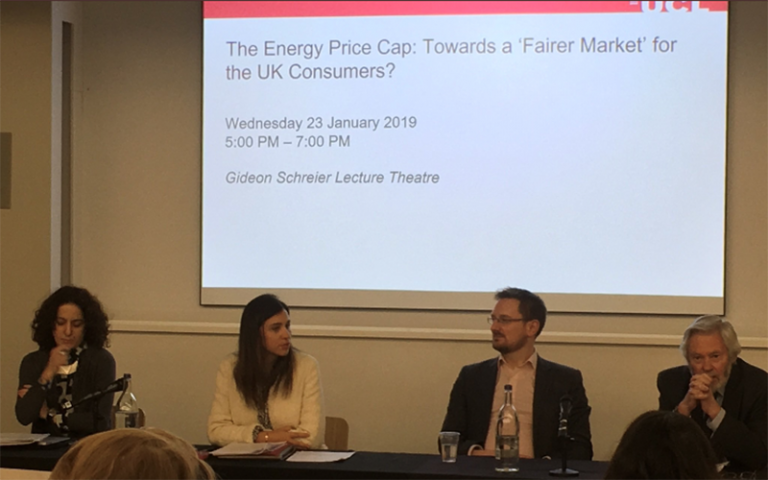UCL CLES hosts timely event on the UK Energy Price Cap
5 February 2019
The Energy Price Cap: Towards a ‘Fairer Market’ for the UK Consumers? was organised by the UCL Centre for Law, Economics and Society.

On Wednesday, 23rd January 2019, leading academics and policymakers came together to discuss the competition implications of the recently imposed energy price cap for the UK household consumers at a timely event hosted at Bentham House and organised by the UCL Centre for Law, Economics and Society.
The Energy Price Cap, introduced by the UK Domestic Gas and Electricity (Tariff Cap) Act came into force on 1st January 2019 and protects around 11 million households in England, Wales and Scotland, who are currently on poor value, standard variable tariffs (SVTs). It is significant, insofar as it represents a repudiation of the overarching UK and EU paradigm of consumer empowerment that has primarily informed regulatory remedies to date. This paradigm, as it is reflected in the EU policy discourse, prioritises consumer empowerment rather than direct consumer protection measures, such as retail price regulation.
Dr Deni Mantzari, Lecturer in Competition Law at UCL Laws, kicked off the discussion by offering a legal perspective on the imposed price cap, which included a consideration of price caps as affordability instruments and the way these are regulated by the EU energy and competition law provisions. Her presentation was followed by that of Mr Joe Perkins, Chief Economist at Ofgem, who offered an insightful analysis on the underlying rationales for the imposition of the price cap, as these were informed by the CMA’s laborious energy market investigation, and elaborated on its design and implementation. Dr Maria Ioannidou, Senior Lecturer at Competition Law at Queen Mary University London, reflected on the interaction of the price cap, essentially a consumer protection measure with the ongoing process of consumer empowerment and stressed the need to take into account the multiple consumer images and sources of vulnerability before intervening in the market mechanism. Finally, Professor Littlechild from the University of Cambridge offered a critical account of the price cap as a means for addressing consumer disengagement with the market informed by his long academic and policy career in the regulation of utilities.
The presentations were followed by a very lively and open debate with the audience on the limits of competition law in services of general economic interest and how ‘fairness’ considerations can be operationalised in the current substantive and institutional framework governing economic regulation.
A useful background paper of the conference can be downloaded here.
The materials for this event can be accessed on the conference website.
 Close
Close

